Specialty Contact Lenses
Contact Lenses are often seen as a luxury. However, for many individuals Specialty Contact Lenses are the only way to achieve functional vision and lead a successful, fulfilling life.
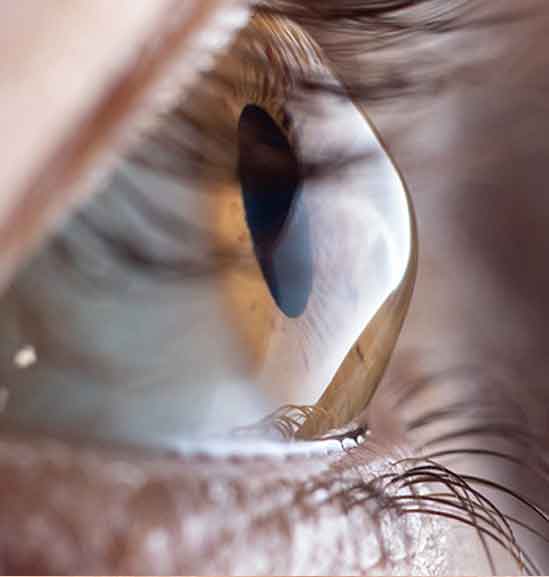
About the Cornea
Clear Surface on The Front of the Eye
This smooth and regular surface focuses light back through the eye to the retina. There the light is detected and that signal is send back to the brain to understand what the eye is seeing. This entire system is predicated on the cornea being able to accomplish this task.
Unfortunately, there are many conditions such as Keratoconus (see image), Pellucid Marginal Degeneration, after trauma or infection, or after a corneal surgery (transplant, LASIK, PRK, or RK) where the cornea becomes irregular and warped.
When this occurs, glasses and traditional soft contact lenses cannot provide adequate vision. You cannot pass the driver’s license test, watch television or see a movie, or watch your child play sports or perform in a play.
However, these conditions need not keep you from enjoying your life!
Specialty Contact Lenses overcome the problems faced by patients with irregular corneas. And there are options, with many types of Specialty Contact Lenses for different conditions and disease severity.
Types of Specialty Lenses
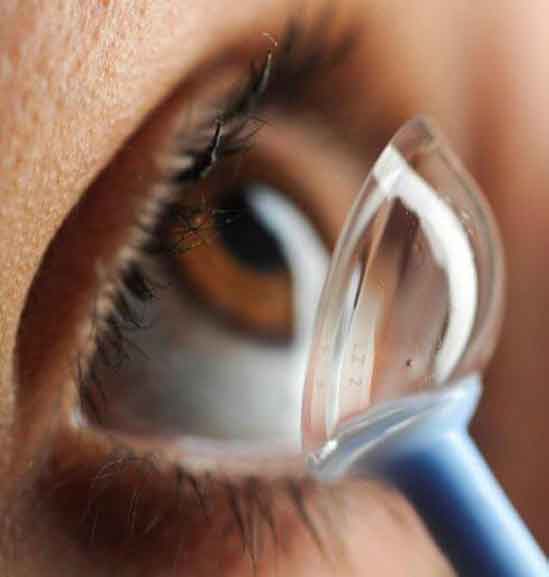
Scleral Contact Lenses
Scleral Contact Lenses are unique. Nearly every contact lens on the market, both soft and hard, have one thing in common – they all rest on the cornea.
What are Scleral Contact Lenses?
Along with hard lenses and hybrid lenses, Scleral Contact Lenses are Specialty Contact Lenses that are designed to restore vision in patients with corneal disease or after corneal surgeries.
There are many situations (due to disease or surgery) where the cornea is not stable, uniform, or healthy enough for a contact lens. Scleral Contact Lenses are perfectly suited for this situation.
The very large diameter of Scleral Contact Lenses are designed to clear the cornea and rest only on the white of the eye called the Sclera.
Hence the name, Scleral Contact Lenses.
How do Scleral Contact Lenses Work?
Scleral Contact Lenses are designed to avoid touching the cornea completely. Instead, these lenses ‘vault’ over the compromised cornea and rest only on the white of the eye. Below are cross sectional images of one of our patients with Scleral Lenses showing how they work.

In the center there is no touching between the lens and the cornea.

On the white of the eye you can see the lens resting entirely on the sclera and clearing the cornea.
While this fitting concept might just seem novel, in reality there are very important and unique benefits of Scleral Contact Lenses for both vision and comfort.
Vision with a Scleral Contact Lens
With advanced corneal disease (like Keratoconus above), the ocular surface is so distorted and irregular that clear vision is not possible. Certainly a cornea transplant (PKP) could be performed. However, the recovery from a corneal transplant is very difficult. Because of their complete coverage of the cornea, Scleral Contact Lenses act like a PROSE (Prosthetic Replacement of the Ocular Surface Ecosystem). Basically a corneal transplant without a corneal transplant By putting one of these lenses onto the eye, you are essentially replacing the diseased cornea with the smooth and uniform surface of the contact lens. Saline solution then fills up the area between the contact lens and the cornea to create a prosthetic visual system.
Comfort with a Scleral Contact Lens
While it might seem counter intuitive, Scleral Contact Lenses are even more comfortable than most SOFT contact lenses. How? The cornea has the most nerve endings of any tissue on the surface of the body. However, the sclera has very few nerve endings. By avoiding the cornea and only resting on the sclera, these lenses provide very little “awareness” feeling to the user. Because these lenses are so large, they are actually sit entirely behind the eyelids. Therefore, when you blink, you don’t rub across the edges of the contact lenses. This lack of lid interaction further enhances their comfort. These two factors make Scleral Contact Lenses one of the most comfortable lenses to wear.
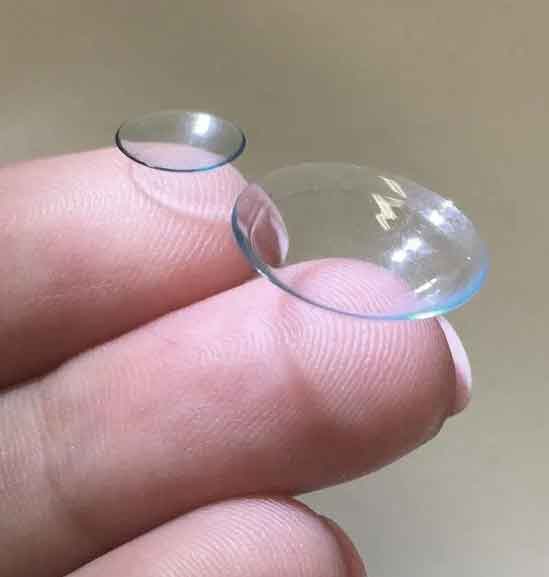
Who Needs a Scleral Contact Lens?
These large diameter hard lenses are not meant for the average contact lens wearer (below at left compared to a regular hard contact).
Scleral Contact Lenses are designed to work when glasses and conventional contact lenses fail.
By vaulting completely over the cornea, this contact lens option provides a new, smooth corneal surface that masks underlying problems with the cornea and allows clear vision and improved comfort when nothing else can.
There are quite a few indications for these lenses as outlined below.
- Ectatic corneal diseases where the contour of the cornea isn’t smooth but instead bulging and irregular: such as Keratoconus or Pellucid Marginal Degeneration.
- Irregular corneas after corneal surgeries (PKP, RK, LASIK, others)
- With corneal scarring after infection.
- Severe Dry Eye where the fluid reserve under the lens bathes the cornea throughout the day and improves comfort and quality of life.
We Will Find Your The Right Fit
If you have been told that you need specialty or medically necessary contact lenses in the past, but never had success due to vision or comfort problems. We suggest that you ask your eye care provider, or schedule an evaluation at our office, to experience the comfort and clarity that Scleral Contact Lenses can provide.
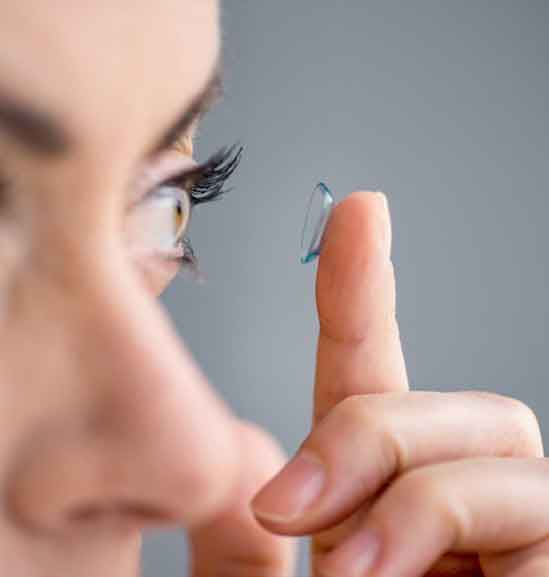
Hard Contact Lenses
Small diameter hard contact lenses (also called gas permeable contact lenses) are made of hard plastic and are designed to correct for a variety of prescriptions. Hard contact lenses were very common 30 years ago but have fallen out of favor as soft lens technology has advanced. These days soft contact lenses can correct for most common refractive error like nearsighted, farsighted, and astigmatism. While soft lenses may be more comfortable, hard contact lenses offer far better vision. Hard contact lenses do not bend or distort like soft lenses. This results in superior optics and improved quality of vision. Hard contact lenses are most useful for patients that want the best vision possible or in patients with very high prescriptions. In addition, hard contact lenses are also useful for patients with certain corneal disease like Keratoconus. Because hard contact lenses do not flex or bend on the eye, they can form a new surface for these patients with disease.
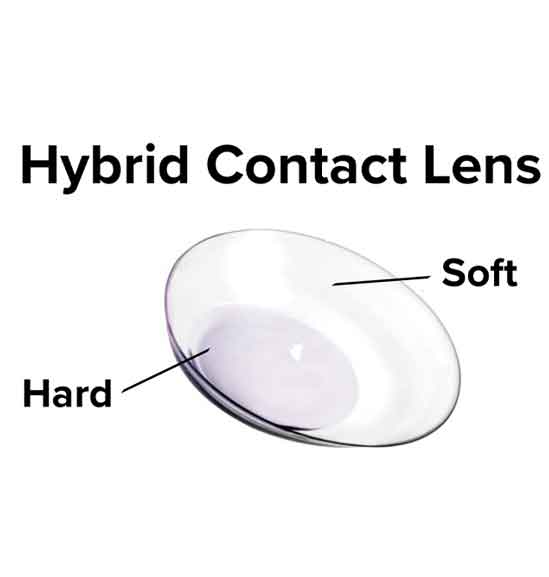
Hybrid Contact Lens
The Best of Both Worlds
For many years there where two types of contact lenses: Hard and Soft. But with recent advancements in technology there is now a third: the Hybrid Contact Lens.Hard (or gas permeable lenses) offer the best vision possible. However their rigid design makes them more uncomfortable and difficult to adapt to.
On the other hand, soft lenses offer incredible comfort. But with vision that is not as crisp. This is especially true of soft lenses when confronted with moderate to high astigmatism or an irregular cornea from keratoconus or other ectasia.
A Hybrid contact lens offers the best parts of both lenses without the drawbacks.
How do Hybrid Lenses Work?
In the center of a hybrid contact lens is a rigid oxygen permeable hard lens and attached to that is a skirt made of soft contact lens material (see photo above). This combination allows excellent vision from the hard lens while the soft skirt centers the lens on the eye and makes it more comfortable to wear. The two parts are permanently bonded allowing a seamless transition and an extended lens life. Below is cross sectional image showing the lens sitting on the eye.
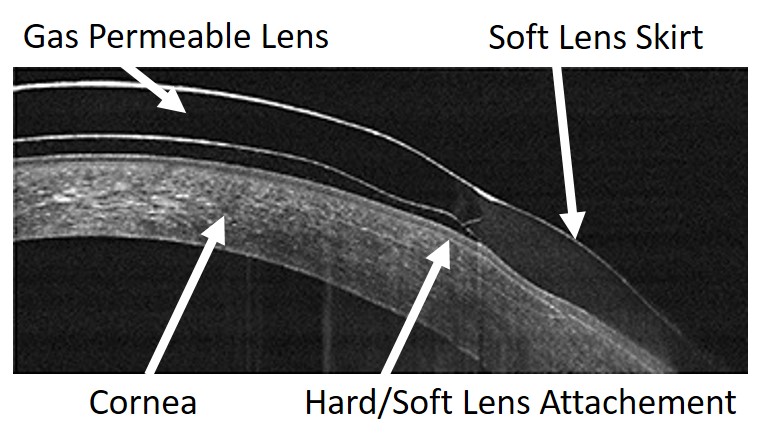
Hybrid contact lenses are manufactured by an American company called SynergEyes® and a hybrid contact lens is typically replaced biannually or every 6 months. SynergEyes® lenses are prescribed by a contact lens specialist. While considered specialty contacts, a hybrid contact lens is beneficial for anyone who wants better vision than soft contact lenses but struggled with the comfort of a hard contact lens. They are particularly useful for patients with higher astigmatism and patients with a compromised cornea from disease (like keratoconus).
Ready For Better Eye Health?
We're ready to help get you on the path to seeing the world through fresh eyes. Schedule your appointment today!
